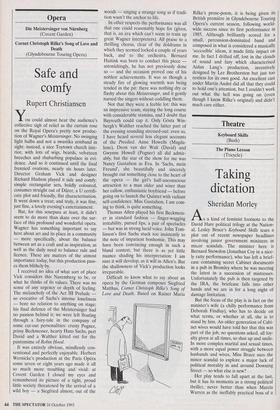Opera
Cornet Christoph Rilke's Song of Love and Death (Glyndebourne Touring Opera)
Safe and comfy
Rupert Christiansen
You could almost hear the audience's collective sigh of relief as the curtain rose on the Royal Opera's pretty new produc- tion of Wagner's Meistersinger. No swinging light bulbs and not a swastika armband in sight: instead, a nice Toytown church inte- rior, with lots of wigs, beards, velveteen breeches and rhubarbing populace in evi- dence. And so it continued until the final frenzied ovations, nearly six hours later. Director Graham Vick and designer Richard Hudson played it safe and comfy: simple rectangular sets, boldly coloured, costumes straight out of Darer, a U certifi- cate plot and friendly, flat characterisation. It went down a treat; and truly, it was fine, just fine, a lovely evening's entertainment.
But, for this sourpuss at least, it didn't seem to do more than skate over the sur- face of this profound and wonderful opera. Wagner has something important to say here about art and its place in a community — more specifically, about the balance between art as a craft and as inspiration, as well as the daily need to balance rule and licence. These are matters of the utmost importance today, but this production pass- es them blithely by.
I received no idea of what sort of place Vick considers this Nuremberg to be, or what he thinks of its values. There was no sense of any. urgency or depth of feeling. The melancholy of the Act III Prelude so evocative of Sachs's intense loneliness — bore no relation to anything on stage; his final defence of the Meistersinger had no passion behind it; we were left floating through a fairy-tale in the company of some cut-out personalities: crusty Pogner, prissy Beckmesser, hearty Hans Sachs, pert David and a Walther kitted out for the pantomime of Robin Hood.
It was entirely obvious, mindlessly con- ventional and perfectly enjoyable. Herbert Wernicke's production at the Paris Opera some seven or eight years ago made it all so much more troubling and vivid: at Covent Garden I closed my eyes and remembered its picture of a tight, proud little society threatened by the arrival of a wild boy — a Siegfried almost, out of the woods — singing a strange song as if tradi- tion wasn't the anchor to life.
In other respects the performance was all that one could reasonably hope for (given, that is, an era which can't seem to train up great Wagner interpreters). All praise to a thrilling chorus, clear of the doldrums in which they seemed locked a couple of years back, and to the orchestra. Bernard Haitink was born to conduct this piece astonishingly, he has not previously done so — and the occasion proved one of his noblest achievements. It was as though a steady fire of glowing warmth was being tended in the pit: there was nothing dry or flashy about this Meistersinger, and it gently nursed the singers without coddling them.
Not that they were a feeble lot: this was an impressive team, staying the long course with considerable stamina, and I doubt that Bayreuth could cap it. Only Gosta Win- bergh's Walther reached the latter part of the evening sounding stressed-out: even so, I have heard several less elegant accounts of the Preislied. Anne Howells (Magda- lene), Dean van der Walt (David) and Gwynnc Howell (Pogner) all did admir- ably, but the star of the show for me was Nancy Gustafson as Eva. In 'Sachs, mein Freund', she beautifully and sincerely brought out something close to the heart of the opera — the girl's half-unconscious attraction to a man older and wiser than her callow, enthusiastic boyfriend — before going on to launch the Quintet with radiant self-confidence. Miss Gustafson, I am com- ing to think, is quite something.
Thomas Allen played his first Beckmess- er in standard fashion — finger-wagging irritability, pursed lips, a pair of spectacles — but was in strong lucid voice. John Tom- linson's first Sachs stuck too insistently to the note of impatient bonhomie. This may have been convincing enough in such a bland context, but there is as yet little nuance shading his interpretation: I am sure it will develop, as it will in Allen's. But the shallowness of Vick's production looks irreparable.
Difficult to know what to say about an opera by the German composer Siegfried Matthus, Cornet Christoph Rilke's Song of Love and Death. Based on Rainer Maria
Rilke's prose-poem, it is being given its British premiere in Glyndebourne Touring Opera's current season, following world- wide success since its first performance in 1985. Although brilliantly scored for a small, percussion-dominated band and composed in what is considered a musically `accessible' idiom, it made little impact on me. In fact I drifted off, lost in the clouds of sound and fury which characterised Aidan Lang's production, inventively designed by Lez Brotherston but just too restless for its own good. An excellent cast under Martin Andre did all that they could to hold one's attention, but I couldn't work out what the hell was going on (even though I know Rilke's original) and didn't much care either.


























































 Previous page
Previous page